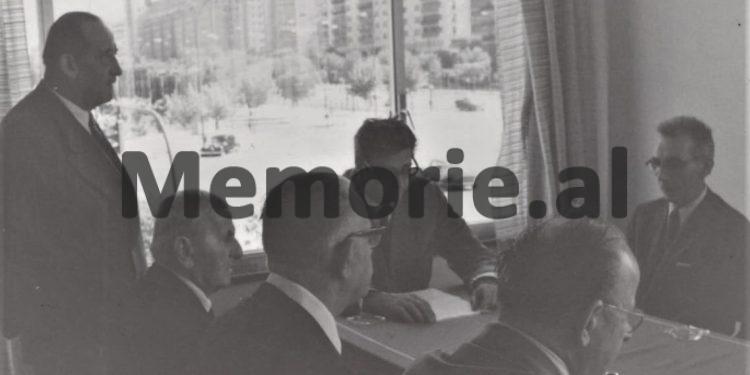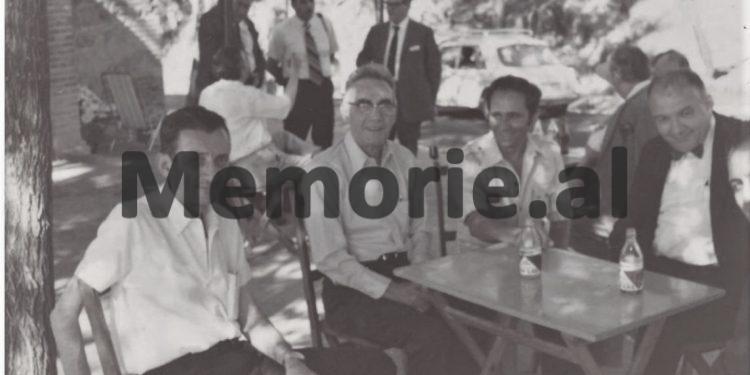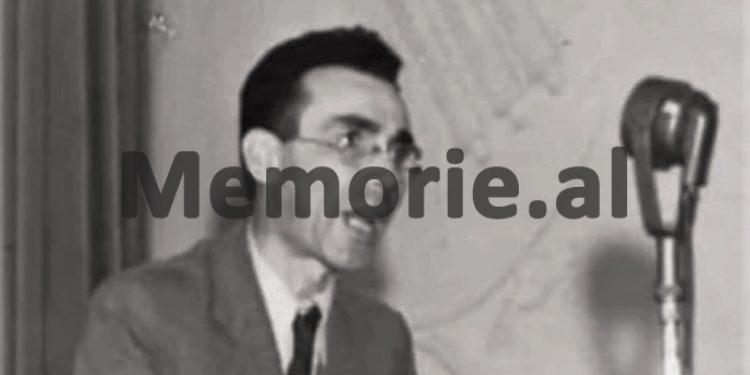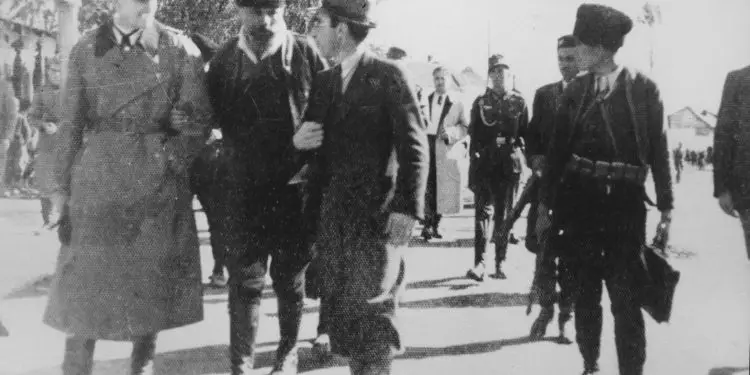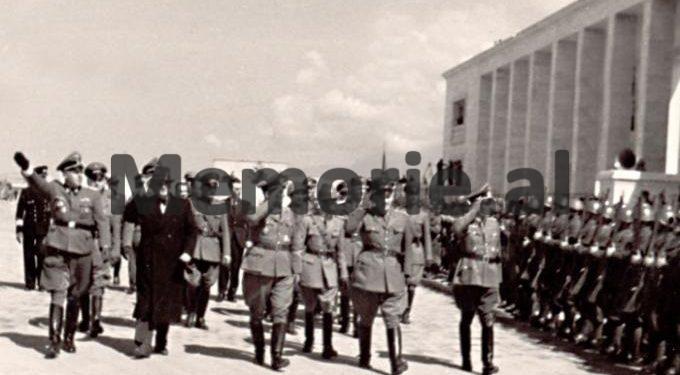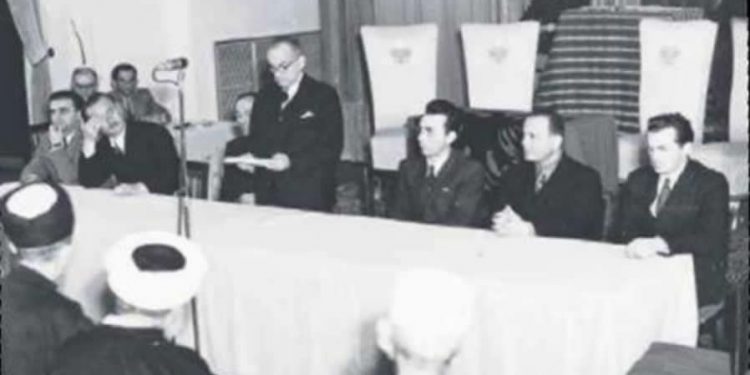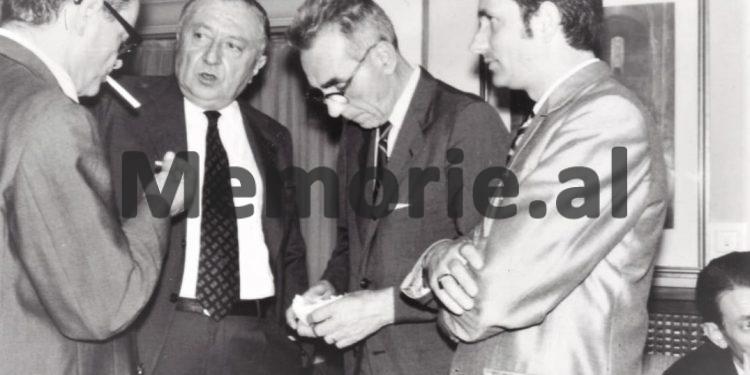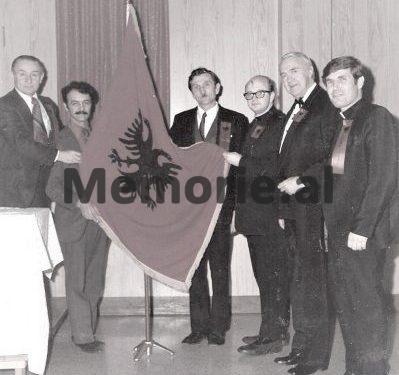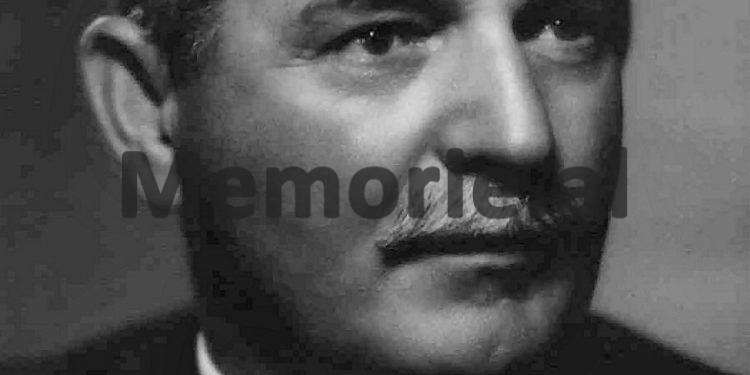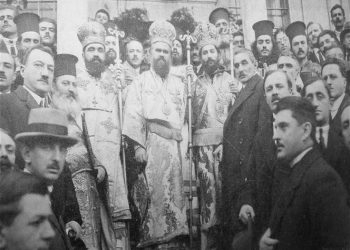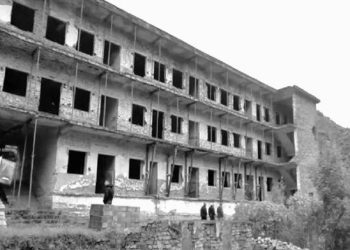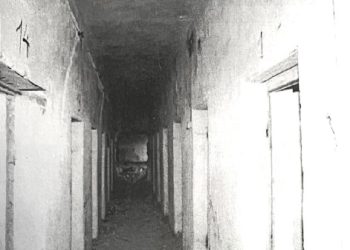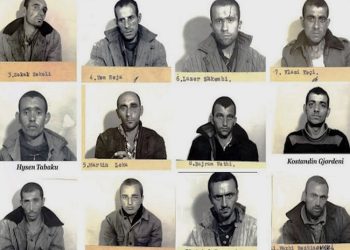By Idriz Lamaj
Part six
From the works of the apostles of ethnic Albania
Xhafer Deva
In light of his own letters and other diaspora revelations
Foreword
Memorie.al/ Probably like many others, I often browse letters with my friends and associates, who are no longer in this life. Browsing through them, for a moment unfolds memories that it seems to me that some of them can serve our history. Then, I return to the awareness of the current difficult situation in the ethnic homeland, caused by the quadruple of Albanian politics, I say to myself: “What can my memories of others or the letters of the people of dead? ”
Without being the ominous instigator of pessimism, thinking as always of a better future, I return to my obligations to my friends, and as an icy observer of time, without any claim of historical service, when I am given the opportunity of publication, write what I have in mind, always based on their writings and letters. This principle is also followed in this book about Xhafer Deva. I knew Xhafer Deva in person; we exchanged visits and had a strong correspondence.
I spent days off at his house and inherited all of Xhafer Deva’s correspondence with Rexhep Krasniqi, his closest friend, for more than 40 years. After many years, I talked on the phone with Mrs. Deva’s daughter and son-in-law. In the conversation going on, taking advantage of the old friendship, I asked about his letters and they informed me that it was all Qefali Hamdia, a friend of their family.
In June of last year (2001) I went to Kenosha, Wisconsin, a guest of Qefali Hamdia, to look at Xhafer Deva’s correspondence, which Mrs. Deva sent her years ago, when she, due to her advanced age, was closed his house to go to the house of his 5th daughter and son-in-law, Mrs. Burgl Dagmar and Rev. Dennis Logie.
After reading the bulk of the letters, in the languages I knew, I took with me more than a thousand pages of his correspondence, covering a period of over 30 years, 1945 – 1978. Xhafer Deva spoke and wrote seven – eight languages. His correspondence is: Albanian, English, German, Italian, French, Turkish and Serbian. Xhafer Deva’s letters and writings, with the exception of those in Old Turkish and Serbian in Cyrillic, are mostly typewritten, well-kept, and alphabetically arranged, with the persons he dealt with.
That includes his family letters. He carefully kept a copy of every letter he sent and every letter he received. Mrs. Oswalda Deva, daughter Burgl, son-in-law Dennis Logie and Mr. Qefali Hamdia with family, expressed his heartfelt thanks for the trust they gave me. With special gratitude I recall here the help given to me by my brothers – Captain Nue Gjomarkaj and Nikoll Gjomarkaj, in the preparation of one of the most important chapters of this book.
Kapidan Nou, in addition to making available the subject on Xhafer Deva’s relations with the ‘Independent National Bloc’ and sending paratroopers to Albania and Kosovo, reviewed with me each document of that period, and we formulated the text in the form of a conversation; while Nicholas, deciphered the letters, transcribed and translated from Italian, the unpublished materials to date, which were published in this chapter.
Continues from the last number
Xhafer Deva’s life and activity in exile
– Kosovo in the time of ethnic Albania –
Xhafer Deva in the light of his own letters
Xhafer Deva’s relations with the ‘Independent National Bloc’ and their parachute missions in Albania and Kosovo
- Respect for the right to private property without exception, reforms in accordance with the spirit of the time when they are done only for the economic and social progress of the people. Small land estate is respected. As for the land real estate, not only is its current employee not obliged to return it, but he is recognized the right of ownership and its products. As for the buildings of any kind, such as: houses, shops, mills, hotels, warehouses, etc., they are returned to the owners if the collective interests are not affected, and in this case, they are rewarded.
- The request, during the stay in exile, of any suitable means to liberate the homeland from the cruel yoke of today, to accept and ask for the cooperation of every person, group or entity that is inspired by the pure feeling of the liberation of Albania.
- The consideration that the institutional solution in Albania is a right that belongs only to the Albanian people, when the full freedom of voting is returned to them, and that today the task of a party in exile is the action put the Albanian people in a position, to freely express his will.
- The opinion that in liberated Albania should not be formed:
- a) political parties with a religious character; b) political parties, subsidized by non-Albanian sources; c) political parties, which are part of foreign, national or international formations; c) political parties, which abuse democratic freedoms, intend to establish totalitarian regimes, and d) political parties, which are baptized with names, surnames or e) titles of persons;
- The acceptance of secularism in state affairs supports and honors the freedom of religion, along with its exercise and conscience;
- The idea that education will aim at the formation of a young citizen, who, regardless of ethnicity, be equipped with all the most modern theoretical and practical information needed to be a factor of national well-being, is also elevated personal and family situation.
- Education is run by the state. Schools of different religious communities, in order to enjoy the right to formulate their own curricula in terms of morality and the exercise of faith, are obliged to implement the national curriculum and to submit to the control of government educational authorities;
- Supporting the repatriation of all those deportees with Albanian origins, who have perpetuated the cult of docks and national sentiments, even if they have received foreign citizenship;
- The need to strive for friendly relations, on a level playing field, with all states, and especially with neighboring states, to strictly preserve national rights;
- The economic regulation of the country on the support of private initiatives in harmony with the state ones, on the prohibition of the creation of any monopoly or privilege and on the balance of all means of production in accordance with the general benefit of the workshop of the arm and the mind;
- Non-prohibition of the intervention of foreign capital, when it is subject to conditions inspired by the non-infringement of legitimate private and state interests;
- Categorically opposed, in the transitional period that will be created in Albania in the case of regime change from communism to a free democracy, of any revenge or executive action without a regular trial.
After the Statute, the ‘Independent National Bloc’ started its activity in different directions. In March 1947, he published the first issue of the newspaper ‘L’Albanie libre’, followed by the magazine ‘Lajmëtari i të merguemit’.
Activity in Albania.
Question: You and the main leader of the ‘Bloc’, Kapidan, have not spoken or written much about the activity of the ‘Bloc’ in Albania. Some people, activists of that time, have written their memoirs, without mentioning the ‘Block’; they have spoken about Mirdita, as the capital of the activity. You who have all this archival material of that time, how can you briefly summarize this activity of the party that you were one of its four founders and you have run it for at least a quarter of a century?
Answer: “For sending the missionaries (paratroopers) to Albania, the safest province was needed for the success of such an activity. In the logical judgment of the initiators of this mission, it was Mirdita, where the freedom fighters were still operating. Mirdita under the leadership of the leaders of the armed squads, for Orosh: Llesh Preng Bajraktari, Bardhok Marka Gjoka and Nikoll Gjet Ndoj For Spaç: Gjon Dodani and Gjoni i Zi For Kushne: Nue Bajraktari and Pjeter Llesh Gjoni For Diberr: Marka Jak Bajraktari and Dod Marka Gjoka For Fand: Marka Gjok Ndoj e Marka Biba For Kthella: Frrok Melyshi, Marka Cara, Preng Dod Gjini, Bib Marka Biba For Headquarters: Ndrec Lufi, Geg Borshi For Rranx: Gjon Mhilli, Lam Daci For Malësi of Lezha: Nue Llesh Bajraktari, Kol Lushi, headed by Captain Mark Gjonmarku, who was in contact with other provinces of the North.
To begin his work as early as 1945, to overcome his superhuman suffering and sacrifice, he reached in June 1946 the organization for the outbreak of the national revolution, which was believed to bring about the overthrow of the communist regime. Sadly, when the preparations for the outbreak of the uprising were being completed, on June 13, 1946, the organizer, Captain Mark Gjomarku, was a heroic witness in the field of honor, for the liberation of the homeland.
The manly death of this classic hero of the Northern Mountains was mourned not only by his close and distant collaborators, but also by all the honest Albanian people, who groaned for a free and democratic Albania, after all were supported by him hopes of salvation. Captain Mark died, but his work did not die.
Following the instructions given by him, after many sacrifices and unceasing and tireless work, the reorganization of the Mirdita Subcommittee took place. For the formation of the Mirdita Subcommittee, it was appointed: all the leaders of the previously appointed squads remained in power. In order to replace the leaders we killed in various battles, the following qi were chosen: Orosh: Mhill Kol Gjeta, Preng Ded Marka Gega, Zef Dod Pervuka, Llesh Marka Tuçi and Ded Kaziu. Dibërr: Shtjefen Marka Prenga, Frrok Dod Topuzi. Lezha Mountains: Gjok Dod Perbrunga, Llesh Pren Nikolli, Gjin Jaku, Zef Pjeter Gjoni. Kthellë: Preng Ruçi, Gjin Kros Buna, Zef Dod Lek Gega. Kurbin: Tom Nikoll Mhilli, Marka Lok Piroli, Preng Llesh Gjergji.
This Subcommittee was chaired by Llesh Gjomarku (Mark Gjomarku’s brother), who was tasked with organizing the people in a constructive way for the uprising and the uninterrupted armed resistance against the communist regime; also tireless activities on the part of the ransom authorities, against the spies and traitors of the people. “In the meantime, the suffering is supernatural for the mountain squads, as well as the very heavy losses.”
Question: On August 9, 1947, Llesh Gjomarku was martyred in the line of duty, his third, after a six-hour battle. With the sacrifice of the life of this tireless fighter, it can be seen that a black shadow falls across Mirdita and that the communists reap a great victory. With the murder of your two brothers, is the resistance in Mirdita extinguished?
Answer: “Resistance is always going on, many times even more furious, except that, alas, in terms of political leadership, it remained quite disoriented. Although we were aware of the anti-communist resistance in Mirdita, after the assassination of Mark Gjomarku and the assassination of Llesh Gjomarku, it seemed almost impossible to us. a resistance so strong, but Besa gave it, had done its miracle, so much so that it angered everyone.
The proof was given to us by these fighters who in 1948, moved to Greece, and were: Nikoll Melyshi with son Gjoni and Brother Nue Melyshi, Gjon Gjinaj, Nue Pjetri, Pjeter Gjoci, Bardhok Gjeta and Nue Frisku, who informed us, t ‘ accurately describes the situation and existence of freedom fighters operating in Mirdita. We were now confident that every activity was crowned with success.
In the summer of 1947, I received a request to send a missionary to Albania. That request tempted me to study the problem, and although we were in exile a bit from Mirdita, I got in touch with Nikoll Plaku from Fandi and Preng Ndoj, from Burgli, who were ready for such a mission. The proposal that was made to me was to send it by sea. The request to send them by sea did not fill my mind, but I had to ask the interested party.
Both of them answered me: we do not know the terrain by sea and we are left to be brought to you through the swamps and brooks of the Coast of Mata and we will be killed. Based on the explanation of these two, I asked for the airline, but then I was refused. Thus the initiative failed. Time was moving fast, the communist regime was stabilizing day by day, but the national resistance in Mirdita, although in a very difficult situation due to the strong pursuit of the communist police, stood with weapons in hand and did not bow to their every attack and oppression. .
Mirdita was the main province and the only one that guaranteed action. In the review of this situation and based on the data of Nikol Melyshi with friends, the idea of sending loyal people to Mirdita was reinforced. For this delicate task, Nue Pjetri and Nue Melyshi were invited, who, with a definite and final attitude, decided: to do it as soon as possible. Time does not wait. This group (Nue Pjetrit and Nue Melyshi), for security, joined the group from Elbasan (Alush Leshanaku and Xhevdet Blloshmi).
After several months of preparation, these four knights, on February 15, 1949, were the first to burst the iron curtain that surrounded Albania. Sadly the dumping was done badly, through the pilot’s fault: intentionally or unintentionally. Nue Pjetri and Nue Melyshi jumped first and fell in the appointed place, while Alushi and Xhevdeti fell in Macukull, and thus remained to be separated from their friends. These two (Alushi and Xhevdeti), if they do not know the country and do not ask anyone, so that they can direct them, decide to leave as soon as possible and continue on the road to the Greek border.
Nue Pjetri and Nue Melyshi, after many hardships and fatigue caused by the heavy snow, on February 20, 1949, arrive in the village of Ndershenë and head to a house that has been a national base, hoping that they will find welcome and support again. The master of the house welcomed them openly, fed them and gave you the first news, albeit bitter. He told them that many gang leaders were killed in fighting with the communists: Frrok Melyshi Bajraktari, Mark Nue Bajraktari, Pjeter Llesh Gjoni, Major Lodovik Saraçi, Marka Cara, Bardhok Marka Gjoka, Pjeter Paloka, Gjin Paloka, Nue Gjet Ndoj, and many others.
The next day, on February 21, 1949, they arrived in the village of Kthella e Epërme and headed to a house that they believed would be the same as before, always a national base, and indeed it was a duel, because they were warmly received. They received other more detailed news from the owner of the house. They took a two-day break there. The owner of the house immediately put them in relation to the group of Preng Dod Gjin Keçi, Bib Marka Biba, Preng Zef Tarashi and Nuue Nikoll Prenges.
These four fighters had a meeting in Qafmollë with the groups of Malsisë e Lezhës and with that of Ded Kolziu, Llesh Marka Dodës, Llesh Marka Tuçi and Gjon Marka Çupi. In those meetings, they had decided to stay in contact with each other and to connect with the groups of Nue Bajraktari, Marka Dod Lleshaj, Marka Jak Bajraktari and Gjok Dod Perbrunga. At those meetings, March 15, 1949, was set as the date for the next meeting.
On March 23, Nue Pjetri and Nue Melyshi together with the group of Preng Dod Gjin Keçi met with the group of Llesh Marka Tuçi, Llesh Marka Doda, and Preng Zef Tarazi in Qafëmolle. There Nue Pjetri read the letter he had with him, signed by Captain Gjon Marka Gjoni of Nue Gjomarku, with heartfelt greetings, and in detail for an organization of resistance. Memorie.al
The next issue follows




